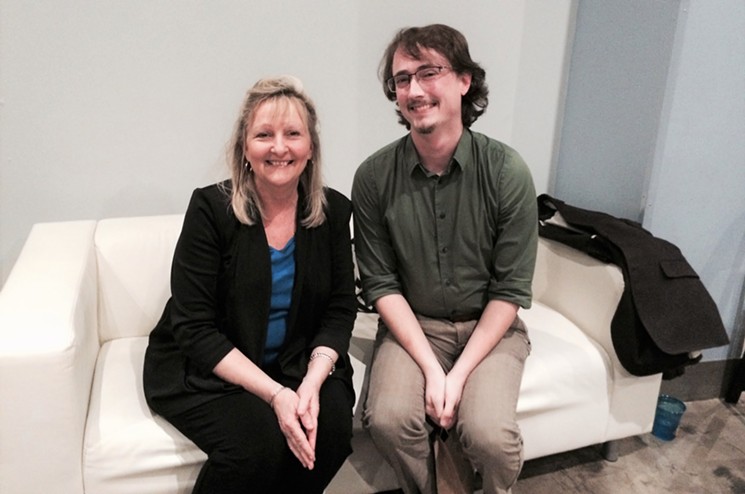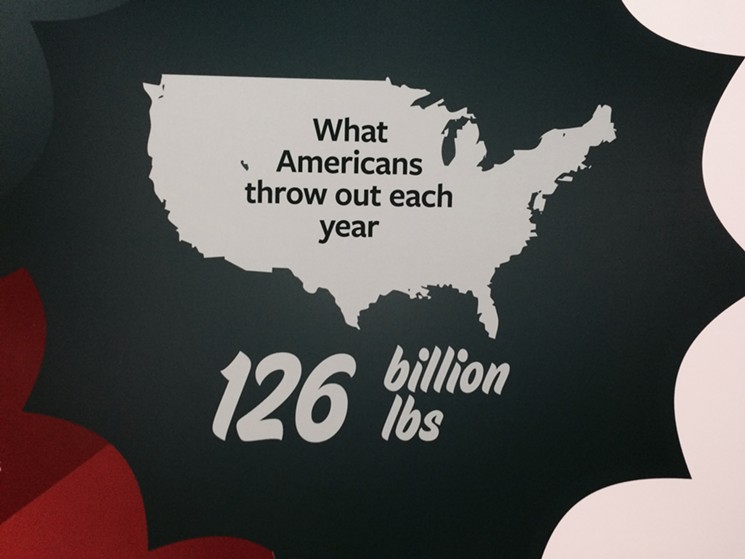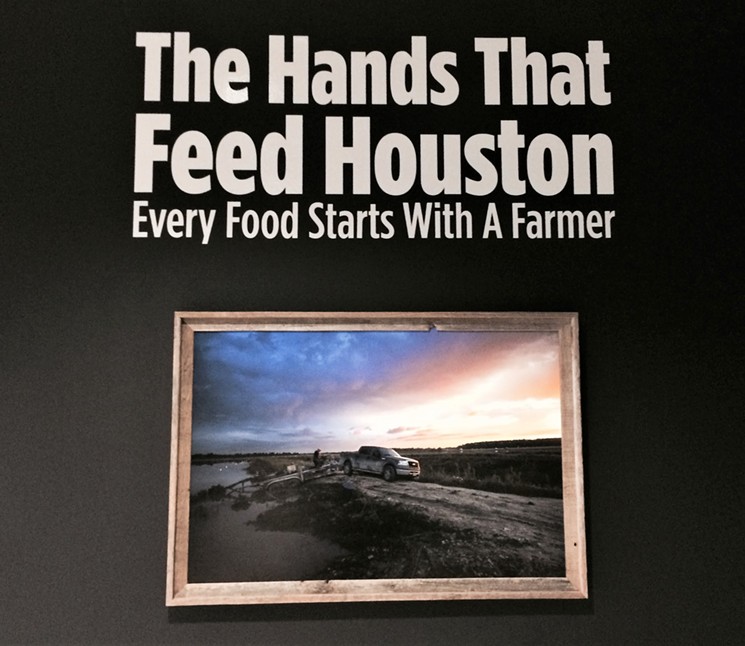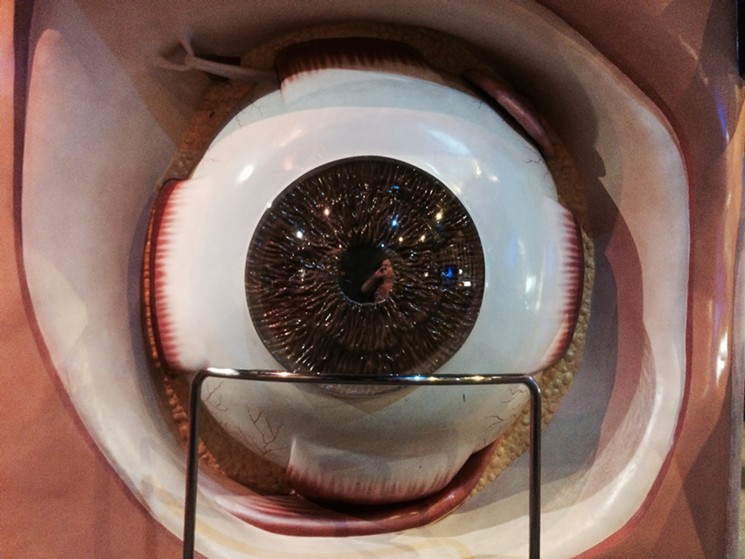Houston is chock full of residents who call themselves "foodies" and our growing exposure on the international culinary stage has made the city a destination for gourmands seeking the most creative dishes Houston chefs have to offer. There are also the everyday tourists looking for the best barbecue, Viet-Cajun crawfish and Mexican food that have cemented Houston as a culinary town in the first place.
However, amid all the television celebrities finally including our city in their "places to go" lists and the renown of local chefs such as Chris Shepherd and Hugo Ortega, the city also faces, as most metropolitan areas do, a growing population. And with the increasing population, comes the question: " How do we feed everyone?"
Food insecurity is nothing new. From earliest foragers and hunters trying to find enough food for survival to famines and natural disasters that have caused actual starvation, humankind has struggled with this issue. Sometimes, it is even a humankind-engineered problem, with food being used as a political weapon.
The John P. McGovern Museum of Health and Science's exhibit The Global Kitchen, in partnership with the American Museum of Natural Science in New York, offers visitors insight into just how big a problem food insecurity actually is.
The Global Kitchen exhibit starts with a video showing how different cultures eat and raise their food. It's full of information that many people may not know such as the prediction that the world's population is estimated to grow to nine billion by 2050. That's a lot of mouths to feed and the exhibit offers some solutions, though some may not be particularly appetizing.
Globally, 75 percent of land used to raise food is for animal products, whether it be for livestock or growing the food to feed them. While vegetarians and vegans believe that our dependence on animal products is the main problem, agriculture itself is responsible for thirty percent of global greenhouse emissions, according to the exhibit.
And of course, any exploration into the world of global food issues must include the waste that humans create. While some nations deal with lack of food, others have enormous amounts of food waste. Even in wealthier countries, some members of the population experience food insecurity on a daily basis while others are throwing away uneaten produce and leftovers.
The exhibit is effective in demonstrating the food waste that an average American family creates in a year and it's a point that many of our citizens, young and old, should heed. It goes beyond wilted lettuce and overripe bananas. Americans and other first-world citizens have become accustomed to eating what they feel like eating, not eating what must be eaten first. We may not feel like having the leftover roast pork again. Three days later, it's in the garbage.
While some of the exhibit may go over the heads of smaller children, the 3-D display of typical breakfasts around the world with its lifelike eggs, bacon and preserved meat made one little visitor next to me "hungry". It's a paradoxical word. We say we are "hungry" when we crave food or our stomachs are telling us it's time for our next meal. Yet, hungry also means not having enough food for sustenance. Hunger has become the word to describe the condition of a billion people in this world and not just sub-Saharan Africa. We "fight hunger." We "feed the hungry."
The solutions proposed in the exhibit are thought provoking. Along with the increase of plant-based meat substitutes, there are other ideas taking form in laboratories around the world, such as growing meat from animal cells. However, just as genetically modified crops are a hot button issue with many consumers, test tube beef will most certainly have detractors. Some feel that making food even more of a commodity than it already is will lead to a world where those with power and means will be able to control the rest of the populace.
In conjunction with the exhibit, the museum also has a photographic display from local photographer Amy Scott which features some of the Houston area's farmers and ranchers. " The Hands That Feed Houston" gives an intimate glimpse into the daily lives of the people who are producing our food locally, including Jeremy Peaches of Fresh Life Organic, Felix Flores of Black Hill Meats and Elizabeth Nyuma, a Liberian refugee, of Plant It Forward Farms.
So, how do we feed nine billion people in the future? The Health Museum has regular Cocktails and Conversation events in which they bring in speakers and experts to share their thoughts on various topics concerning health and nutrition. I attended a recent museum event, How to Feed a Growing Planet. I expected that I would be part of an audience listening to three panelists give lectures from their expertise. Instead, it was a casual grouping of individuals seated comfortably, asking questions and discussing solutions.
Kathy Lipman, one of the guest speakers, is the Corporate Engagement Senior manager for Houston Food Bank. She has helped to institute the Senior Box program which is responsible for providing food to 11,000 food-insecure seniors in Harris, Montgomery, Fort Bend and Brazoria counties. Houston Food Bank has an 18 county service area, so there is always a desperate need for volunteers and donations. Lipman also brought up the fact that there are many college students who are food insecure and some campuses across the nation have campus food banks. The nearby city of Cleveland has a growing problem of homeless high-schoolers and Houston Food Bank donates bags of food to these young people.
We asked Lipman about the social media debate on whether it is best to donate food or money. She said Houston Food Bank welcomes it all and doesn't feel that it is their place to tell people how to give.She also suggested that anyone interested in volunteering can go to the Houston Food Bank website and put in their zip code to find volunteer opportunities.

Kathy Lipman and Gabriel Durham are helping to save our piece of the planet.
Photo by Lorretta Ruggiero
The third speaker was Dr. Shreela Sharma, doctor of epidemiology at UT Health School of Public Health. Sharma and Lisa Helfman founded Brighter Bites in 2012, a non-profit whose mission is to provide healthy food to children who may not have access to fresh produce. Since its inception, the organization has delivered more than 21 million pounds of fresh produce to more than 265,000 individuals. Besides getting fresh food into people's hands, Brighter Bites is also focused on educating the public on how to use the food they are given. Sharma said she was shocked at the fact that some children she met had never eaten an orange or didn't know what a blueberry was. She is concerned about policy changes to SNAP, which will push more people into poverty. She believes that we must build evidence to influence policy shifts. One such piece of evidence she shared was that a person's zip code could affect his or her life expectancy by decades, as reported by the UT Southwestern Medical Center.
All three of the panelists deal with food insecurity and sustainability issues on a professional basis, but their passion for the food supply chain was encouraging in a room of people who were at the event because they too are concerned. There was the retiree from the oil and gas industry who was concerned about the ever-increasing population and how the world will feed the next generations, including his own children and grandchildren. There was a young man concerned about children not getting lunch at school. There was a vegetarian who wondered if vegetarianism might be the answer for our future. There were other attendees concerned about health and the prevalence of diabetes in their own families and the general population.
Becky Seabrook, Senior Director of Guest Engagement, mentioned the museum's partnership with Aspire Food Group, an Austin-based company that is working to bring insect-based cuisine to the public, including cricket powder flour and snacks. While it's bizarre to most Americans, insects are a staple food in many other cultures. The Health Museum recently hosted a cricket eating contest and a cricket buffet, which included flavors such as Texas BBQ, Sriracha and sour cream and onion flavored cricket snacks.
For those who think that insects may be the wave of our culinary future, the museum is throwing a Valentine's Day dinner, Love Bugs and Love Bites, February 14, beginning with a cocktail hour at 6 p.m. followed by a three course dinner at 7 p.m. The event is a collaboration with restaurateur David Cordua, Aspire Food Group and chef Jason Hayes. Dishes include Corn and Cricket Arepa, Pan-seared Chicken with Cricket Mole Negro and a dessert trio of tres leches, cricket and cayenne chocolate truffle and churros with dulce de leche. Check out its website for more information. Your Valentine will definitely be surprised.
The Health Museum
1515 Hermann Drive
www.thehealthmuseum.org
713-521-1515
Houston Food Bank
www.houstonfoodbank.org
Volunteer Services Hotline: 713-547-8604
Brighter Bites
www.brighterbites.org






